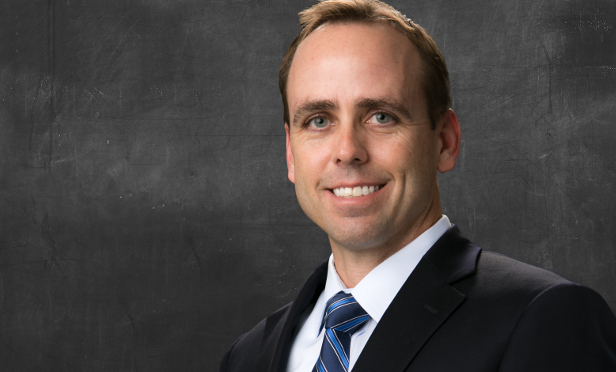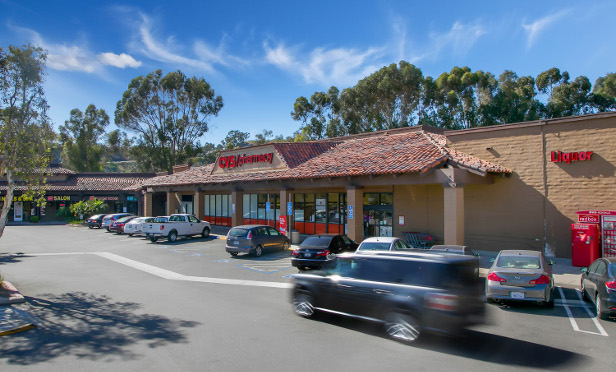
SAN DIEGO—Investors are able to add value and create synergies in “passive” retail investments by upgrading some of the older, legacy tenants with newer, contemporary tenants and adding more nationally and regionally recognized stores and restaurants, CBRE's SVP Kirk Brummer tells GlobeSt.com. Brummer is part of EVP Philip Voorhees' National Retail Partners-West team who, in conjunction with San Diego-based SVP Reg Kobzi, recently completed the sale of Riverdale Shopping Center, a neighborhood retail center Mission Gorge submarket here, for $10.1 million.
The shopping center is anchored by CVS/pharmacy, along with a synergistic mix of food, service and retail co-tenancy. CBRE retail experts Voorhees, Brummer, Jimmy Slusher, Megan Wood, Sean Heitzler and Kobzi represented the seller, a partnership advised by San Diego based commercial real estate investment firm SENTRE, which includes Peckham Properties Inc., Commercial Sites Limited and Wells Fargo Bank, N.A., in its fiduciary capacity as trustee of McKinney Survivor's Trust. The buyer, also represented by Kobzi, was San Diego-based Becker Properties LLC, which purchased the property as an addition to its portfolio.
We spoke with Brummer about why this property is considered a “passive” investment, how synergies can be creative in passive properties and the types of tenants that work best in these assets.

GlobeSt.com: What makes this property a “passive” investment for the buyer?
Brummer: Riverdale Shopping Center is a 100%-leased neighborhood shopping center ideally located within a dense, infill San Diego County trade area. All of the tenants are on triple-net leases with minimal near-term lease expirations and a very established tenant roster with a majority of the tenants operating in the center for more than 10 years, including CVS, which has operated in the center for more than 39 years. In addition, the average contract rents in the center are well below market rents, creating embedded value and future upside for a buyer. Properties with these attributes are extremely attractive to “passive” investors, particularly those in 1031 exchanges such as the buyer for Riverdale Shopping Center.
GlobeSt.com: How do investors create synergies between the long-term tenants and new ones in these passive investments?
Brummer: Investors in properties such as Riverdale Shopping Center are able to add value and create synergies by upgrading some of the older, legacy tenants with newer, contemporary tenants and adding more nationally and regionally recognized stores and restaurants. In the case of Riverdale Shopping Center, a significant portion of the tenants are paying below-market rents, providing an investor the opportunity to upgrade tenant and credit quality, increase the rents and generate more daily foot traffic to the center, which benefits the entire center.
GlobeSt.com: What types of new tenants fit well into such investments?
Brummer: Internet-resistant tenants providing food, beverage and “daily trip” services fit well in neighborhood centers such as Riverdale Shopping Center.
GlobeSt.com: What else should our readers know about this sale?
Brummer: Riverdale Shopping Center is subject to a long-term ground lease that typically decreases the overall buyer pool. Leasehold properties generally trade at a discount relative to comparable “fee”-owned assets. Our NRP-West team was able to narrow this discount or spread in the cap rate by creating a competitive bidding environment from several unique, private-capital investors ultimately selling it to a qualified local investor who was in a 1031 exchange.

SAN DIEGO—Investors are able to add value and create synergies in “passive” retail investments by upgrading some of the older, legacy tenants with newer, contemporary tenants and adding more nationally and regionally recognized stores and restaurants, CBRE's SVP Kirk Brummer tells GlobeSt.com. Brummer is part of EVP Philip Voorhees' National Retail Partners-West team who, in conjunction with San Diego-based SVP Reg Kobzi, recently completed the sale of Riverdale Shopping Center, a neighborhood retail center Mission Gorge submarket here, for $10.1 million.
The shopping center is anchored by CVS/pharmacy, along with a synergistic mix of food, service and retail co-tenancy. CBRE retail experts Voorhees, Brummer, Jimmy Slusher, Megan Wood, Sean Heitzler and Kobzi represented the seller, a partnership advised by San Diego based commercial real estate investment firm SENTRE, which includes Peckham Properties Inc., Commercial Sites Limited and
We spoke with Brummer about why this property is considered a “passive” investment, how synergies can be creative in passive properties and the types of tenants that work best in these assets.

GlobeSt.com: What makes this property a “passive” investment for the buyer?
Brummer: Riverdale Shopping Center is a 100%-leased neighborhood shopping center ideally located within a dense, infill San Diego County trade area. All of the tenants are on triple-net leases with minimal near-term lease expirations and a very established tenant roster with a majority of the tenants operating in the center for more than 10 years, including CVS, which has operated in the center for more than 39 years. In addition, the average contract rents in the center are well below market rents, creating embedded value and future upside for a buyer. Properties with these attributes are extremely attractive to “passive” investors, particularly those in 1031 exchanges such as the buyer for Riverdale Shopping Center.
GlobeSt.com: How do investors create synergies between the long-term tenants and new ones in these passive investments?
Brummer: Investors in properties such as Riverdale Shopping Center are able to add value and create synergies by upgrading some of the older, legacy tenants with newer, contemporary tenants and adding more nationally and regionally recognized stores and restaurants. In the case of Riverdale Shopping Center, a significant portion of the tenants are paying below-market rents, providing an investor the opportunity to upgrade tenant and credit quality, increase the rents and generate more daily foot traffic to the center, which benefits the entire center.
GlobeSt.com: What types of new tenants fit well into such investments?
Brummer: Internet-resistant tenants providing food, beverage and “daily trip” services fit well in neighborhood centers such as Riverdale Shopping Center.
GlobeSt.com: What else should our readers know about this sale?
Brummer: Riverdale Shopping Center is subject to a long-term ground lease that typically decreases the overall buyer pool. Leasehold properties generally trade at a discount relative to comparable “fee”-owned assets. Our NRP-West team was able to narrow this discount or spread in the cap rate by creating a competitive bidding environment from several unique, private-capital investors ultimately selling it to a qualified local investor who was in a 1031 exchange.
© 2025 ALM Global, LLC, All Rights Reserved. Request academic re-use from www.copyright.com. All other uses, submit a request to [email protected]. For more information visit Asset & Logo Licensing.







